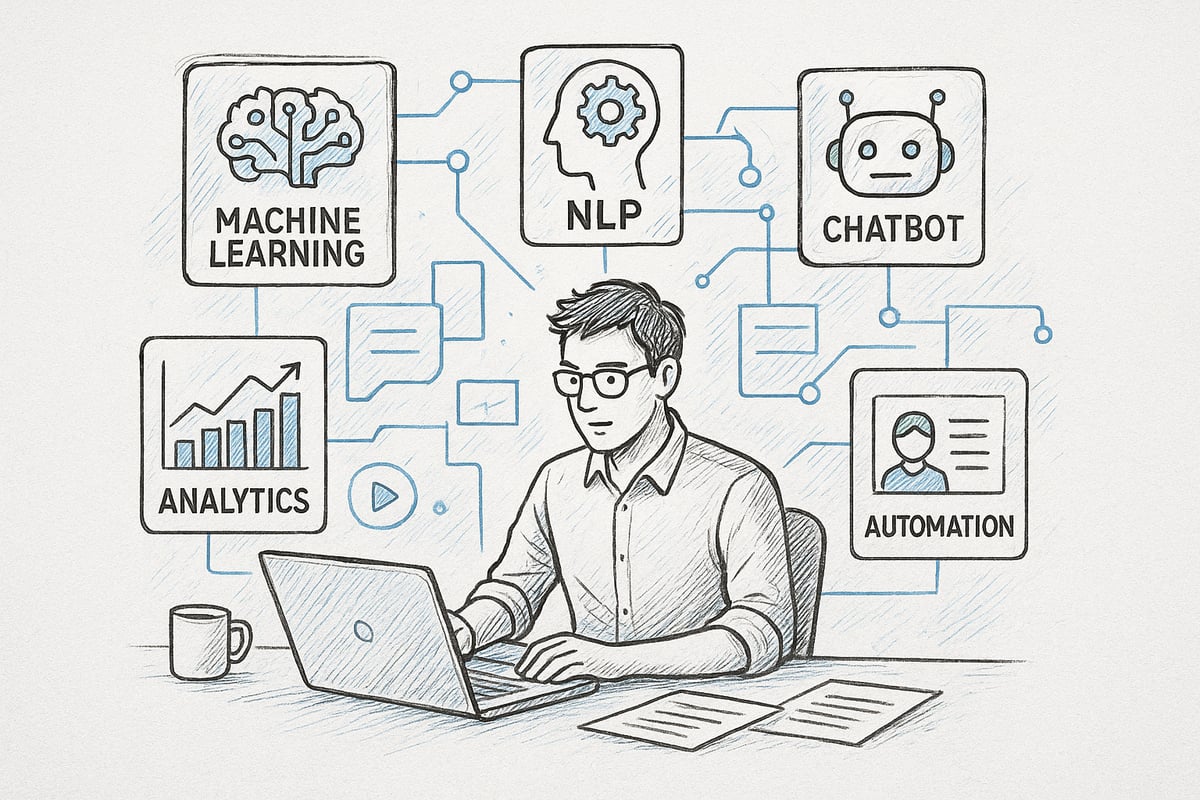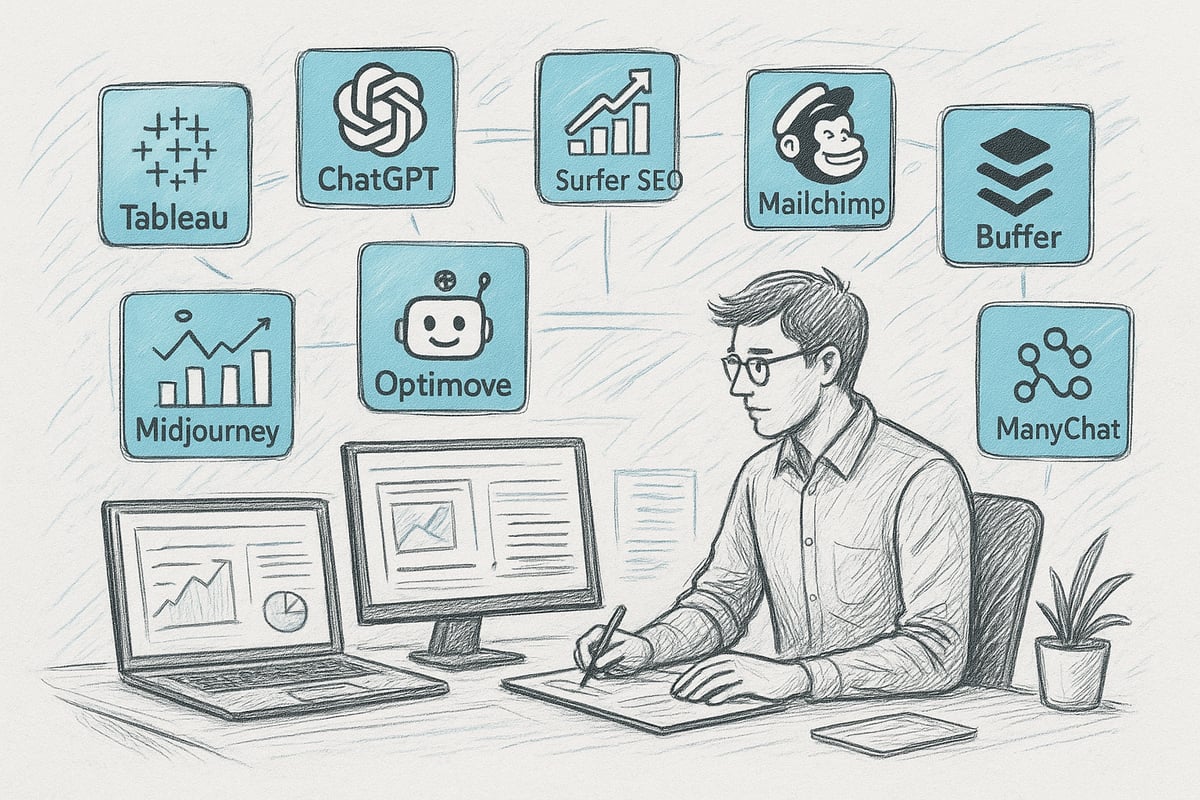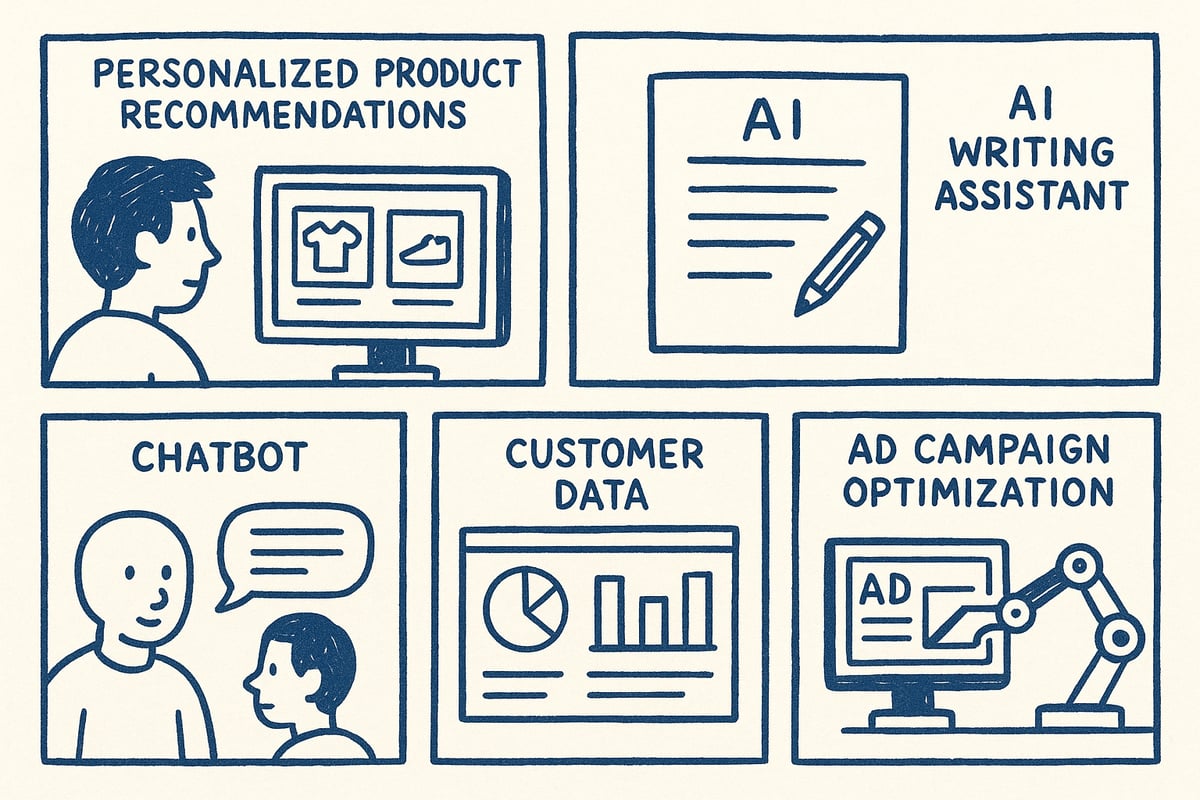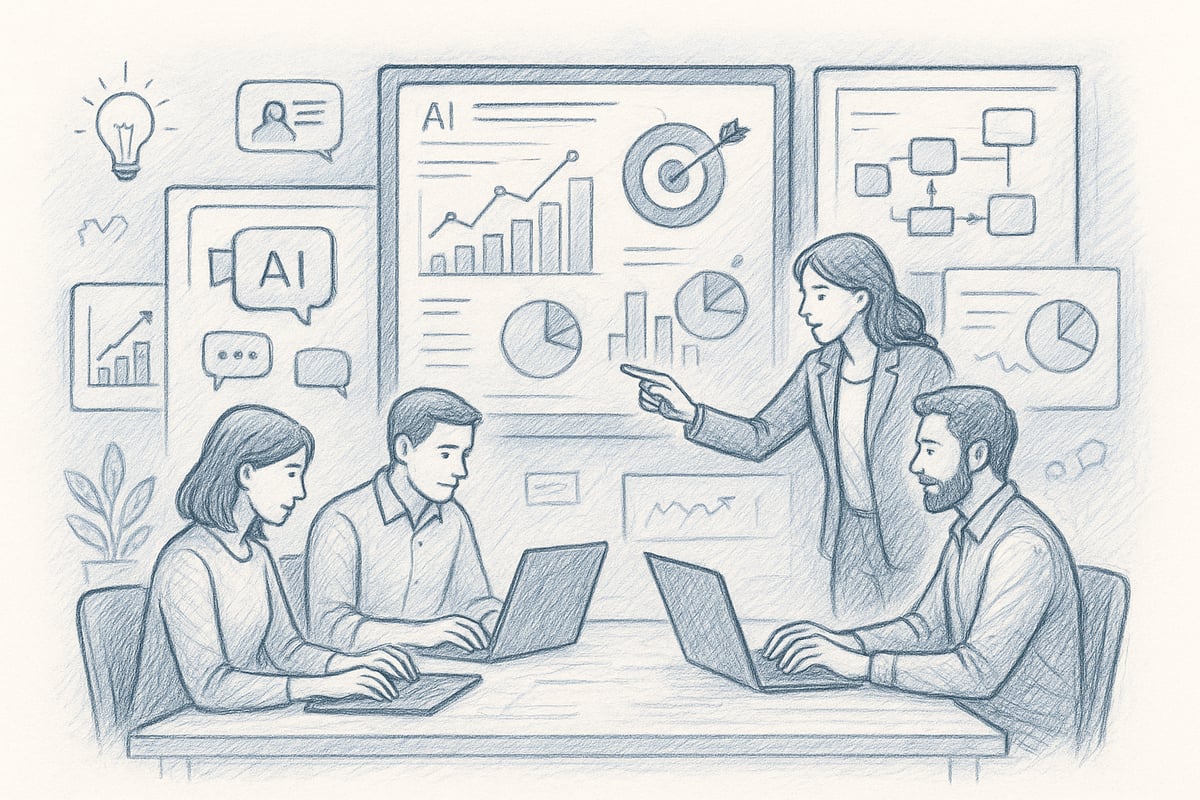AI in digital marketing has moved from science fiction to the center of marketing innovation in 2025. Marketers now rely on AI to unlock powerful insights, automate campaigns, and personalize every customer interaction. This guide will show you how to harness AI in digital marketing to boost productivity, efficiency, and creativity.
You will discover essential tools, real-world applications, step-by-step strategies, and the latest best practices. Learn how industry leaders like Netflix and Sephora use AI to stay ahead. Ready to master the future? Explore this guide and ensure your digital marketing success in the age of AI.
Understanding AI in Digital Marketing
Artificial intelligence is no longer a distant vision. Today, ai in digital marketing is transforming how brands connect with audiences, gather insights, and drive growth. At its core, AI refers to systems able to perform tasks that typically require human intelligence, such as analyzing data, recognizing patterns, and making predictions. In digital marketing, AI integrates with tools for data collection, machine learning, and natural language processing, enabling marketers to deliver more relevant content, automate campaigns, and personalize user experiences. According to a McKinsey Global Survey, many organizations are redesigning workflows and retraining employees to support AI adoption. Importantly, AI enhances human creativity and strategy rather than replacing them. For a deeper dive into how AI is revolutionizing marketing, see AI for Marketing Strategies.

What is AI in Digital Marketing?
AI in digital marketing refers to the application of artificial intelligence technologies, such as machine learning and natural language processing, within marketing strategies and platforms. These technologies streamline the process of collecting and interpreting massive volumes of customer data. As a result, marketers gain faster, more accurate customer insights. AI systems not only learn from each interaction but also improve their performance over time as they receive more data and feedback. This adaptability allows brands to stay relevant and responsive. Importantly, AI supports human creativity and decision-making, requiring strategic oversight to achieve optimal results. A common example is AI-powered personalization in content and messaging, where each user receives tailored experiences based on their behavior.
Core Benefits of AI for Marketers
The adoption of ai in digital marketing delivers measurable benefits. Key advantages include:
- Increased productivity: 50% of marketing leaders report a significant impact.
- Improved efficiency: 45% see a major boost due to automation.
- Automation of repetitive tasks, from content creation to campaign optimization.
- Enhanced personalization and customer experience.
- Real-time, data-driven decision-making.
- Cost savings through scalable AI solutions.
- Greater innovation and competitive advantage.
For example, AI tools streamline campaign management, making reporting faster and more accurate. This boosts both team output and return on investment.
Types of AI Used in Digital Marketing
Several types of AI power modern marketing efforts. Core applications of ai in digital marketing include:
- Machine learning for predictive analytics and audience segmentation.
- Natural language processing for chatbots and sentiment analysis.
- Generative AI for content and image creation.
- Computer vision enabling visual search and advanced ad targeting.
- Recommendation engines providing personalized product suggestions.
- AI-powered automation platforms for workflow optimization.
Popular examples are ChatGPT for content, Midjourney for images, and Optimove for customer data management. These technologies allow brands to deliver targeted, creative, and data-driven campaigns.
Key AI Adoption Trends in 2025
In 2025, ai in digital marketing will be integrated across nearly every digital channel, including social, search, email, and paid ads. Marketing departments are shifting toward AI-first strategies, with senior leaders focusing on AI governance and risk mitigation. Companies are hiring for AI-specialized roles and investing in upskilling their teams. There is also a growing emphasis on ethical use, privacy, and addressing algorithmic bias. A recent Mailchimp statistic highlights that 88% of marketers believe they need more AI to meet rising customer expectations. For more global context, the Digital Marketing Institute’s 2024 report confirms these trends are shaping the industry.
AI’s Role in Customer-Centric Marketing
AI empowers marketers to tailor experiences based on each customer’s behaviors and preferences. With ai in digital marketing, real-time personalization happens across every touchpoint. Content delivery becomes dynamic, triggered by user actions. Netflix exemplifies this approach, using AI to recommend shows and increase user retention. Ultimately, AI fosters customer loyalty and drives measurable ROI.
Essential AI Tools and Technologies for Digital Marketing
The rapid adoption of ai in digital marketing has led to an explosion of powerful tools and technologies that are reshaping the industry. Marketers in 2025 have access to an impressive array of AI-driven platforms that streamline workflows, personalize campaigns, and unlock new levels of efficiency. Understanding which solutions to use and how to integrate them is now a core marketing skill.

Top AI Tools for 2025
A variety of top-tier platforms are defining ai in digital marketing this year. Leading tools include ChatGPT and Writer for content generation, Midjourney for AI-powered visuals, and Optimove for customer data insights. Zapier and Manychat automate workflows and customer interactions, while Evolv.ai and Surfer SEO drive optimization across campaigns and search. Mailchimp and Perplexity offer advanced email automation and research capabilities, Drift powers conversational marketing, Buffer manages social scheduling, and Tableau brings deep analytics.
| Tool | Main Function |
|---|---|
| ChatGPT | Content Generation |
| Surfer SEO | On-Page Optimization |
| Mailchimp | AI Email Scheduling |
| Buffer | Social Scheduling |
| Tableau | Analytics |
For a comprehensive overview, see Essential AI Marketing Tools.
Choosing the Right AI Tools for Your Needs
Selecting the best solutions for ai in digital marketing means aligning tools with your business goals and marketing objectives. Start by identifying your primary use cases—content, ads, analytics, or automation. Assess each tool's compatibility with your current systems and consider how user-friendly and scalable it is for your team. Weigh the cost against projected ROI, and prioritize platforms that offer seamless integration and strong support.
- Define your marketing objectives
- Match features to specific needs
- Evaluate integration and usability
- Analyze cost versus ROI
- Test before full implementation
A thoughtful selection process ensures your AI investments deliver measurable results.
AI Integration Across Marketing Channels
Today, ai in digital marketing is present across every channel, driving content creation, social media, email, SEO, and paid advertising. AI writing assistants and image generators accelerate content production. Social platforms benefit from automated scheduling, analytics, and engagement tools like Buffer. Email marketing platforms use AI for predictive send times and dynamic content, while SEO tools such as Surfer SEO handle keyword research and optimization. Paid ad platforms leverage AI for bidding, targeting, and creative testing, providing marketers with actionable insights at every touchpoint.
Future-Proofing Your Tech Stack
To stay competitive, organizations must continuously adapt their tech stacks to the evolving landscape of ai in digital marketing. Regularly evaluate emerging platforms and features, ensuring your team is trained on the latest advancements. Stay informed about industry standards and best practices, and prioritize compliance with privacy and ethical guidelines. Adopting AI-powered analytics tools like Tableau enables deeper insights and more agile decision-making. Ongoing adaptation and training are essential for maintaining a future-ready marketing organization.
Real-World Applications and Case Studies of AI in Digital Marketing
Artificial intelligence is no longer just a buzzword; its practical use in digital marketing is reshaping how brands engage, convert, and retain customers. Let us explore how ai in digital marketing delivers measurable results through real-world applications and success stories.

Personalization and Recommendation Engines
Personalization is a cornerstone of ai in digital marketing, making customer experiences more relevant and engaging. AI-driven recommendation engines use behavioral data to tailor content, offers, and product suggestions in real time. For example, Netflix leverages AI algorithms that analyze age, gender, watch patterns, and more to recommend shows users are likely to enjoy. This approach drove Netflix's e-commerce sales from $580M in 2016 to $3.6B in 2024.
Brands adopting AI personalization report higher engagement and loyalty. According to AI-Driven Personalization Benefits, AI-powered marketing efforts increase revenue and customer satisfaction, highlighting the tangible value of ai in digital marketing.
AI in Content and Image Creation
Generative AI tools like ChatGPT, Writer, and Midjourney are transforming content production for marketers. These tools enable fast, scalable creation of email subject lines, ad copy, landing pages, blog posts, and social media visuals.
Sephora, for instance, uses AI-powered chatbots and its Virtual Artist App to deliver interactive shopping experiences and personalized product recommendations. With ai in digital marketing, brands can produce high-quality, targeted content in less time, improving both creative output and operational efficiency.
Customer Service and Chatbots
Customer service has evolved with the adoption of AI chatbots, which provide instant, 24/7 support on websites and social channels. Natural language processing (NLP) allows these bots to understand and respond to customer inquiries effectively, while escalating complex issues to human agents when necessary.
Manychat's AI integration with WhatsApp and social media exemplifies this trend. As a result, 88% of marketers believe AI and automation are necessary to meet customer expectations, showing how ai in digital marketing is essential for responsive, scalable support.
Customer Segmentation and Predictive Analytics
Effective segmentation is vital for targeting and personalization. AI algorithms in digital marketing segment audiences based on interests, behaviors, and needs, enabling real-time targeting and message customization.
Platforms like Optimove use AI to analyze customer data, predict future behaviors, and recommend strategies for cross-selling and upselling. By leveraging ai in digital marketing, brands can deliver precise campaigns that boost engagement and conversion rates.
AI in SEO and Paid Advertising
AI automates critical SEO and paid advertising tasks, from keyword research to bid optimization and performance analysis. Predictive SEO uses AI to forecast trends and adapt content strategies, while computer vision and NLP enhance visual and voice search capabilities.
Surfer SEO streamlines content optimization, and AI-driven PPC tools automate bidding and ad creation for better campaign efficiency. Ultimately, ai in digital marketing empowers marketers to adapt quickly to search algorithm changes and maximize advertising ROI.
Step-by-Step Guide: Implementing AI Strategies in Your Digital Marketing
Implementing ai in digital marketing can seem complex, but breaking it down into clear, actionable steps makes the process manageable and effective. This guide walks you through each critical stage, from evaluating your current processes to empowering your team for ongoing success. Follow these steps to unlock the full potential of ai in digital marketing and ensure your strategies are future-proof.

Step 1: Assess Your Current Marketing Processes
Start with a thorough audit of your marketing workflows. Identify repetitive, manual, or data-heavy tasks that slow down your team. Map out where automation and ai in digital marketing could streamline operations, such as campaign reporting, content scheduling, or customer segmentation.
Gather feedback from marketing, sales, and support teams to understand current pain points. Compare your processes with industry standards to find gaps and opportunities. Use this assessment to prioritize which areas will benefit most from ai in digital marketing, setting the stage for a successful transformation.
Step 2: Define Clear AI Objectives and KPIs
Set specific, measurable goals for integrating ai in digital marketing. Align each initiative with broader business and marketing outcomes, such as boosting lead generation or improving conversion rates.
Define SMART objectives (Specific, Measurable, Achievable, Relevant, Time-bound) and select key performance indicators (KPIs) like email open rates, ROI, or customer engagement. Prioritize projects that promise quick wins while planning for longer-term ai in digital marketing initiatives. For example, reducing churn through AI-driven product recommendations is a clear, actionable objective.
Step 3: Select and Implement the Right AI Tools
Research and shortlist ai in digital marketing tools that align with your objectives and existing tech stack. Consider solutions for content creation, analytics, automation, and customer engagement. Pilot new tools in small campaigns before rolling them out at scale.
Ensure your team receives adequate training and onboarding for each platform. Address data privacy and compliance requirements early. For a deeper dive into automating marketing processes, explore the resource on AI in Marketing Automation for practical insights. Choosing the right tools is a critical foundation for effective ai in digital marketing.
Step 4: Integrate AI Across Key Marketing Channels
Leverage ai in digital marketing by embedding AI tools throughout your primary channels. For content creation, use generative AI for blog posts, social media visuals, and ad copy. In email marketing, implement AI for segmentation, dynamic content, and predictive send times.
Automate your social media scheduling and analyze engagement with AI-powered platforms. Use AI for SEO and PPC to optimize keywords, bidding, and ad creative. To supercharge your content workflows, check out ChatGPT Prompts for Marketing and unlock new creative possibilities with ai in digital marketing.
Step 5: Monitor Performance and Optimize Continuously
Track your KPIs and analyze the impact of ai in digital marketing on campaign outcomes. Use AI-driven analytics to spot trends, anomalies, and optimization opportunities in real time.
Conduct A/B testing for AI-generated content, subject lines, and recommendations. Regularly collect feedback from both your team and customers to refine strategies. Tools like Tableau provide advanced analytics for ongoing performance monitoring, enabling continuous improvement of ai in digital marketing efforts.
Step 6: Address Challenges and Ensure Ethical AI Use
Identify and mitigate the risks associated with ai in digital marketing, such as data bias, privacy concerns, and maintaining a consistent brand voice. Create clear guidelines for responsible AI use, ensuring that automation complements, rather than replaces, human judgment.
Monitor your AI tools for unintended consequences. Stay updated on regulations and best practices to ensure compliance. Regular audits of chatbot interactions and content generation help maintain quality, transparency, and customer trust as you scale ai in digital marketing initiatives.
Step 7: Upskill Your Marketing Team for AI Success
Invest in ongoing training so your team can fully leverage ai in digital marketing. Offer workshops on new platforms, data analytics, and ethical AI considerations. Encourage collaboration between marketing, IT, and data science teams to foster innovation.
Promote a culture of experimentation, where learning and adaptation are valued. As ai in digital marketing evolves, developing hybrid skills—combining creativity, data literacy, and technical know-how—will keep your team ahead of the curve and ready to capitalize on emerging opportunities.
Navigating Challenges, Ethics, and the Future of AI in Digital Marketing
As ai in digital marketing continues to evolve, marketers must proactively address new challenges and responsibilities. Understanding the hurdles, ethical concerns, and future directions is essential for sustained success in this dynamic field.
Common Challenges in AI Adoption
Adopting ai in digital marketing is not without its obstacles. Many organizations struggle with:
- Integrating data from multiple sources
- Overcoming resistance to change among teams
- Managing the high upfront cost of advanced AI tools
- Ensuring seamless compatibility with legacy systems
According to AI's Impact on Marketing Strategies, 37% of marketing professionals admit they do not have a defined AI strategy. Addressing these challenges requires clear planning and ongoing investment in both technology and people.
Ethical Considerations and Responsible AI Use
Ethics play a critical role in ai in digital marketing. Marketers must be vigilant about:
- Reducing bias and discrimination in AI-driven decisions
- Maintaining transparency in how algorithms influence outcomes
- Safeguarding data privacy and complying with regulations
Balancing automation with the human touch ensures that marketing remains authentic and trustworthy. Establishing clear guidelines for ethical AI use helps protect both the brand and its customers.
Ensuring Data Privacy and Security
Handling customer data responsibly is a top priority for ai in digital marketing. Key practices include:
- Collecting and processing data with explicit consent
- Implementing robust security protocols for AI systems
- Conducting regular audits to maintain regulatory compliance
Transparent data practices build trust and loyalty among customers. Staying ahead of evolving privacy laws is essential for long-term success in AI-driven campaigns.
The Evolving Role of Marketers in the Age of AI
With ai in digital marketing, marketers are shifting from manual execution to strategic leadership. The demand for hybrid skills is rising, combining creativity, data literacy, and AI expertise. Marketers now serve as orchestrators of customer journeys, often taking on new roles such as:
- AI strategist
- Prompt engineer
- Data ethicist
Senior leaders are increasingly responsible for AI governance and risk management, ensuring that technology aligns with business values.
Future Trends and Opportunities
Looking ahead, ai in digital marketing will drive even greater personalization and automation. Marketers can expect:
- Integration with emerging technologies like AR, VR, and IoT
- Expansion of voice and visual search capabilities
- Growing focus on ethical AI and transparency
According to Future Trends in AI Marketing, those who embrace these changes will lead the next wave of digital transformation.
